Dental Implants Summerfield
Permanent Tooth Replacement That Can Last a Lifetime
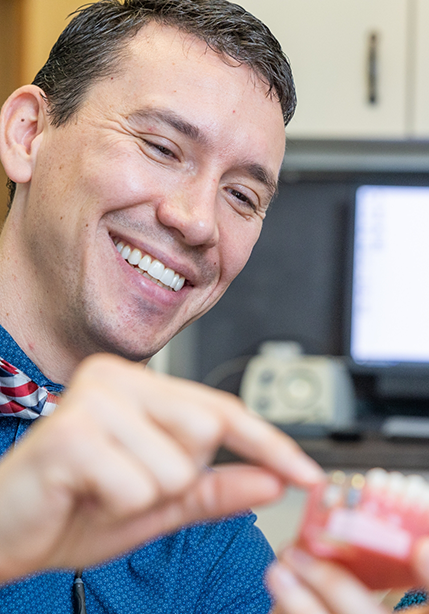
After losing any number of permanent teeth, you’ll likely find that chewing certain foods and pronouncing words clearly have become much more difficult tasks. Eventually, you may notice that the rest of your teeth have started to shift out of place, and your jawbone will start to break down from the lack of stimulation. Replacing your teeth as soon as possible is essential for your oral health, and dental implants are often the best way to do just that. Call Magnolia Shores Dental today to set up a consultation to discuss replacing missing teeth with dental implants in Summerfield with Dr. Parry.
Why Choose Magnolia Shores Dental for Dental Implants?
- Dental Implant Placement & Restoration Provided In-House
- Team Led by Local Expert & KOIS Center-Trained Dentist
- Titanium & Zirconia Dental Implants Available
What Is a Dental Implant?
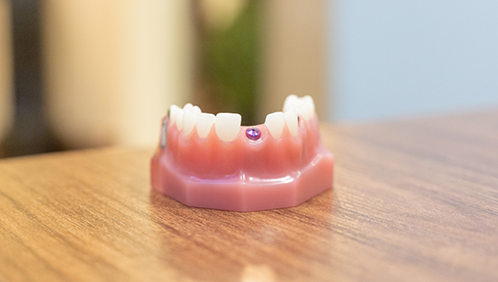
Dental implants are small metal posts that can support artificial teeth. While other forms of tooth replacement rest on the gums or on natural teeth, implants are inserted directly into the jawbone itself; this gives them the unique ability to act as artificial roots that stimulate the bone and prevent it from shrinking. Most dental implants are made from titanium, which is a highly biocompatible metal that can join with the bone through the natural process of osseointegration.
The 4-Step Dental Implant Process
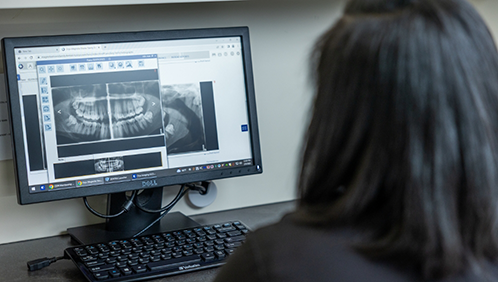
Dental implant placement is a comprehensive process that typically takes several months to complete. Unlike many other practices that have to refer their patients elsewhere for implant placement, Dr. Parry is fully equipped with advanced training and expertise to handle the entire procedure in-house. This not only saves you valuable time and money, but it also ensures continuity of care with the familiar dental team you rely on. If you’d like to learn more about the dental implant process, take a moment to review the following details and feel free to reach out to us with any inquiries.
Initial Dental Implant Consultation
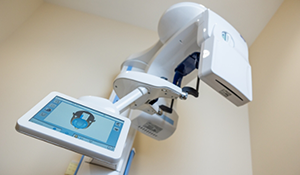
Your first step is to schedule an initial consultation with Dr. Parry. During this visit, he’ll conduct a thorough visual examination and use a CBCT Scanner to capture detailed digital images of your oral and facial structures. These images will then be projected onto a nearby screen, creating a 3D image for Dr. Parry to carefully assess your teeth, gums, jawbone, nerves, and tissues.
Based on this evaluation, he’ll determine your eligibility for dental implants. You’ll discuss preliminary treatments, such as bone grafting, sinus lift, periodontal treatment, or tooth extraction, if they’re necessary, before proceeding with dental implant surgery. This comprehensive assessment ensures that you receive personalized care tailored to your specific needs and sets the stage for a successful dental implant procedure.
Dental Implant Surgery

Once you've had your consultation with Dr. Parry, we'll proceed with scheduling your implant surgery. During this stage, he will begin by administering local anesthesia to ensure your comfort. Then, he will make one or more small incisions in your gums to access the underlying jawbone. Carefully positioning the implant to maximize bone density, he will then cover it with a protective cap to aid in the healing process. This cap not only shields the implant but also helps maintain the shape of your gum tissue.
Dental Implant Osseointegration & Abutment Placement
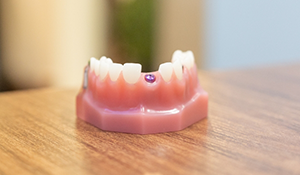
After your oral surgery, your gums will typically heal within a few weeks. However, the process of osseointegration, where the dental implant merges with the surrounding bone tissue, requires more time. This strengthens the foundation for your future tooth restoration as the bond between implant and bone develops.
Depending on the number of dental implants you receive, the complete healing process will take three to six months. Once osseointegration is complete, you'll receive metal abutments that connect your implant to your personalized restoration, marking the final step in your dental implant journey.
Delivery of Dental Implant Restorations

After you finish healing, you'll come back to our office for the placement of your custom-made crown, bridge, or denture. Crafted from top-notch materials, these personalized restorations seamlessly blend with your natural smile. With these enhancements, you'll experience greater confidence, a more attractive appearance, and improved functionality and stability. Plus, your dental implants are designed to last for 30 years or more with proper care and maintenance.
Overcoming Dental Implant Anxiety

Dental implant treatment can be a source of anxiety for many patients, often due to concerns about discomfort, surgery, or the overall experience. However, overcoming these nerves is achievable with the right knowledge and support. At Magnolia Shores Dental, we’ll discuss your concerns and provide options like sedation dentistry to help ease your worries. Taking steps to manage anxiety not only helps ensure a smoother procedure but also enhances your overall oral health and well-being. To learn more about how we can help you overcome dental implant anxiety, continue reading.
Common Concerns About Getting Dental Implants

From anxiety about pain to feeling embarrassed about their current smile, we understand that many patients share these concerns when it comes to dental implants. Some even feel nervous simply walking through the front door! Luckily, Dr. Parry understands these fears and will be happy to meet outside the treatment room to discuss your long-term goals and address your concerns.
Before moving forward with dental implant treatment, it’s incredibly important to have the right information. You need to be well-informed before making this life-changing decision. Rest assured – Dr. Parry and his team are dedicated to ensuring a comfortable and positive experience for every patient.
How We Take Anxiety Out of Tooth Replacement

At our practice, we go above and beyond to make tooth replacement as stress-free as possible. We understand that anxiety is common, so we create a judgment-free environment where patients feel comfortable from the moment they arrive. For those with higher levels of anxiety, we offer sedation options (i.e., oral conscious sedation and nitrous oxide sedation) to ensure a calm and relaxed experience during the procedure.
After your treatment is complete, we’ll follow up to ensure you're healing well and not in pain, providing continued support throughout your recovery. Believe it or not, most individuals can manage their pain with ibuprofen or Tylenol. Once they realize how much easier the healing process is than anticipated, they’re excited to return to the office to complete their journey toward a beautiful, healthy, fully restored smile! Our compassionate and experienced team will ensure your journey is smooth, comfortable, and anxiety-free every step of the way.
Benefits of Dental Implants
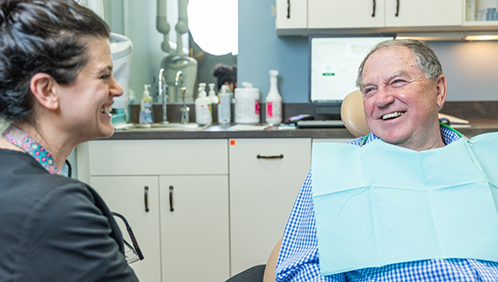
Dental implants are pretty popular as tooth replacements. Dentists place about 500,000 of them yearly! As for why they’re so well-liked, the reason is that they fuse with the patient’s jawbone. This feature grants implants several perks that dentures and dental bridges can’t match. As such, you can trust them to improve your quality of life. To learn more about the benefits of dental implants in Summerfield, keep reading or call us for details.
Day-to-Day Benefits

As you’d expect, the most apparent implant benefits are the day-to-day ones. These typically include the following:
- Lifelike Results – Thanks to their porcelain surfaces, implants both look pretty and blend seamlessly with their surroundings. That means others won’t even notice you have them!
- A Confidence Boost – Implants fill the gaps in your smile, so they’ll naturally help you feel less self-conscious about your looks. From there, you’ll have a better time with friends or family in social situations.
- Effective Eating – Because implants fuse with your jaw, they restore much of your bite force. That means they’ll let you eat your favorite foods again!
- Easy Maintenance – Implants don’t need much upkeep compared to dentures or bridges. You just need to clean them as you would natural teeth. In other words, brush them twice daily and floss between them once daily.
Health Benefits

Aside from the everyday upsides, implants also offer health-related advantages. The most common of these are:
- A Stronger Jaw – When tooth loss goes untreated, your jaw slowly loses bone tissue. That process can then lead to facial collapse. However, implants stimulate your jaw and thus prevent such bone loss.
- Better Teeth Cleaning – Left alone, tooth gaps become breeding grounds for harmful bacteria. Thankfully, implants get rid of these gaps to make teeth cleaning easier. The result is that your risk of oral health problems decreases.
- No Sensitivity – Implants don’t sit on your gums or connect to other teeth. As such, they don’t irritate your mouth tissues like other restorations might.
Long-Term Benefits
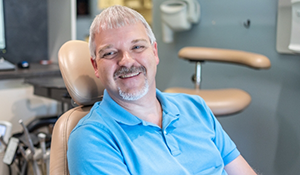
With dental implants, you’ll even get to enjoy long-term benefits. Here’s what you can expect:
- High Success Rate – So long as the placement goes well, implants hardly ever fail. Their ten-year success rate even sits at over 95%!
- Enduring Results – A typical dental implant lasts 15-20 years, making it longer-lasting than dentures or bridges. Better yet, a well-maintained one can have a lifespan of 30 years or more.
- Cost-Effectiveness – Compared to the alternatives, implants save you more money overall. Their longevity means they don’t require many replacements or repair visits. This means that you spend less money on various upkeep fees!
Are Dental Implants Right for Me?

While not everyone is a candidate for dental implants, some steps can be taken to make the procedure more viable. For example, if your jaw currently lacks the density to support implant posts, we might recommend a bone graft. Also, periodontal therapy and other treatments might be necessary to ensure that your mouth is completely free of infection before the surgery. It’s important to know that the implant process will be different depending on how many teeth you’ve lost.
Missing One Tooth
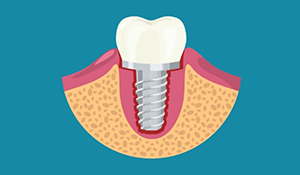
Even if a missing tooth isn’t visible when you smile, it can still throw off the balance of your bite and cause other health difficulties. The gap can be filled with a single implant post that is eventually topped with a porcelain crown after osseointegration is complete.
Missing Multiple Teeth

When three or more teeth in a row are gone, an implant-retained bridge can be used. Traditional bridges rest on two abutment teeth, which involves the removal of enamel. Such alterations can be avoided if the bridge is placed on a pair of dental implants instead.
Missing All of Your Teeth
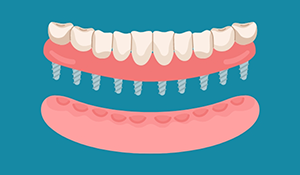
Even people who have lost an entire arch of teeth can still get implants. A full denture can be anchored to four to eight implant posts so that it won’t slip at inconvenient times. When a denture is permanently attached to implants, it can be brushed and flossed just like natural teeth.
Learn More About Implant Dentures
All-on-4 Dental Implants
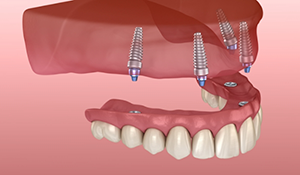
The All-on-4 procedure is an advanced technique that lets those who have suffered from extensive tooth loss get new teeth much faster. Four dental implant posts are strategically inserted into the jaw at specific angles so that they have the strength and stability to support a temporary denture right away.
Understanding the Cost of Dental Implants

When it comes to dental implant treatment (and tooth replacement in general), you truly get what you pay for. Dental implants are considered a long-term investment not just for your smile, but your oral and overall health as well as your quality of life. Since there are so many factors that can influence the final price tag of your care, you’ll need to speak with Dr. Parry first and complete an exam. With that said, you can click the button below to learn about all of the variables that will go into the overall cost.
Preliminary Treatments & Dental Implant Surgery

You need to have a consultation before an estimate of the cost of dental implants can be made. That is because the price is going to vary from patient to patient based on:
- Necessary preparatory procedures (gum disease therapy, bone grafts, tooth extractions, etc.)
- The number of implants needed (which can increase surgery costs)
- The amount of anesthesia used during surgery
Dr. Parry will personally complete every phase of your implant treatment, which means you will spend less compared to offices that require you to work with a specialist for placement.
The Parts of Your Dental Implant
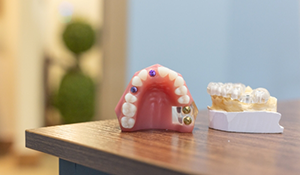
The more implants you need, the higher you can expect your costs to be. This is because more materials, including titanium or zirconia, are needed from the manufacturer. Where the implants are ordered from can also influence the final price tag. More implants also mean more abutments, which are used to connect the restoration to the implant. Dr. Parry will be happy to explain why he uses certain implants and how they will ensure a tooth replacement that lasts longer and works better compared to others.
Final Dental Implant Restoration

If you require a more complex restoration, such as an implant bridge or denture, the cost of treatment goes up because more time and dedication are needed to craft a properly fitting tooth replacement. Not only are the materials designed to look incredibly natural, but they also keep the bite even, preventing undue stress on the jaw joints.
Does My Dental Insurance Cover Dental Implants?

Make sure to review your insurance benefits; not every plan will pay for the implants themselves, but related procedures could still be covered. For example, it’s common for insurance to offer coverage for preparatory treatments like bone grafts or periodontal treatment. The restorations may also be covered at a specific percentage depending on your plan. Our office will gladly go over your benefits and confirm that you are maximizing them to the fullest.
Making Dental Implants Affordable

Even if you don’t have dental insurance, there are other options available to you that make dental implants a more affordable and accessible treatment. For example, we partner with multiple third-party financiers that allow you to make monthly payments on dental services with little to no interest attached. This includes CareCredit, Alphaeon, and Proceed Finance.
Dental Implant Post-Op Instructions

Dental implants are the best tooth replacement option out there. Since they replace the roots of the missing teeth, they offer a wide range of benefits, including additional stability, longevity, and comfort. To achieve this, patients must undergo a surgical procedure and a healing process that takes place over several months. We will provide you with specific aftercare instructions to abide by. Here is a general overview of what they may look like.
What to Do Directly After Dental Implant Surgery

The most important part of the recovery period is not disturbing the blood clot located at the surgical site. This clot is needed for the natural healing process to be successful. Here are some things you should AVOID to keep this blood clot in place:
- Spitting: Swallow your saliva or use a tissue.
- Straws: The suction of the straw can dislodge the blood clot.
- Smoking: You shouldn’t smoke right away following your procedure.
- Touching: Keep your tongue and fingers away from the surgical site.
Common Side Effects When Recovering from Dental Implant Placement

Side effects are common after dental implant placement. Here are some common ones you may encounter.
- Bleeding: Minor bleeding during the recovery period is common. This can be reduced with clean gauze and light pressure.
- Inflammation: For the first 72 hours after your procedure, you might experience some inflammation. You can lessen this with a cold compress.
- Discomfort: Soreness is normal and common after dental implant placement. This can be managed with over-the-counter and/or prescribed pain relievers.
Your Diet After Dental Implant Surgery

After your procedure, stick to softer foods to give the surgical site a chance to heal. Here are a few suggestions.
- Scrambled eggs
- Mashed potatoes
- Pasta
- Soup
- Yogurt
- Oatmeal
- Apple sauce
- Pudding
- Ice cream
Post-Op Health & Oral Hygiene

The day following your surgery, brush your teeth as you normally would. Be careful to avoid the dental implant site. To keep this area clean, gently rinse your mouth with salt water after meals. When you choose a mouthwash, pick one that doesn’t contain alcohol. This can aggravate the surgical site.
What to Do After Your New Teeth Are Attached

Once you have your replacement teeth attached to your implants, the difficult part is over. You might experience some minor sensitivity as you adjust to your new restoration, but this should be easy to manage at home. At this point, you shouldn’t encounter any swelling, bleeding, or extensive recovery. If you have any concerns or questions, don’t hesitate to contact us.
Maintaining & Caring for Your Dental Implants

Some patients think that once real teeth are substituted with dental prosthetics, they no longer have to worry about taking care of their smile, but it’s not true! If you want your implants to last a substantial amount of time, you must maintain them through deliberate, smart lifestyle choices. Our team at Magnolia Shores Dental is here to support you and make this maintenance simple and effective.
Make Oral Hygiene a Priority

Even though your replacement teeth are impenetrable to decay and cavities, bacteria-filled plaque can still build up on them. These bacteria can infect your gums and give you a condition called peri-implantitis, which can lead to implant failure. That’s why you need to continue to clean your teeth through daily brushing and flossing. By keeping your teeth clean at home, you stop bacteria from stealing your restored smile!
Eat a Healthy Diet

The foods you eat don’t just fuel your body; they can also fuel the bacteria in your mouth. Carb-heavy and sugar-filled foods, in particular, are favorites for harmful bacteria. As a result, if you keep your consumption of these substances to a minimum, you can greatly limit oral bacterial growth. On the other hand, you have plenty of healthy food options that contain vitamins and nutrients your body needs to fight infections and strengthen your jawbone and gums.
Break Bad Habits

If you have certain habits, such as smoking, vaping, or chewing on ice, you are putting your smile at risk and endangering your implants. Before you get implants, commit to starting fresh and ending these habits. If you need help, enlist your friends and family to hold you accountable and avoid actions that could lead to failed implants.
Protect Your Dental Implants

Sometimes, the risk of damage feels out of your control. For example, if you grind your teeth while you sleep or play sports, your restored smile could be in danger of an accident. Fortunately, there are oral appliances in each of these cases that can protect your dental implants and stop unnecessary wear, pressure, and damage to your implants.
Schedule Regular Dental Checkups

Just as important as diligent at-home care, attending your checkups with Dr. Parry ensures the longevity of your implants. These appointments allow him to inspect your gums and implants for any signs of infection or complications. If he finds any sign of trouble, he can take care of it long before it causes implant failure. When you leave our office, you can feel confident that your smile will last and stand up to whatever comes next!
Dental Implant FAQs
Does Getting Dental Implants Hurt?
Ahead of surgery, Dr. Parry will administer a local anesthetic. Keep in mind that the jawbone does not have any nerve endings anyway, and while sedation may be recommended, it’s actually not needed in most cases. Many patients note that the procedure is much more comfortable than initially expected. With that said, you may feel sore for the next few days after surgery, but this can be mitigated with painkillers and cold compresses. If your discomfort does not improve after a week or so, get in touch with our office.
How Can I Tell If My Dental Implant Is Failing?
The most common signs that a dental implant is failing include significant discomfort around the implant itself. You may also notice inflamed gum tissue, swollen gums, or the sensation of a loose implant. These indicate that either an infection is present or the implant did not properly integrate. Call our practice as soon as possible if these symptoms appear!
How Long Does Dental Implant Surgery Take?
It really depends on how complex your dental implant treatment is and how many teeth you intend to replace. For example, a single implant can take anywhere between one to two hours to place, while more implants can increase the length of your procedure. Also, keep in mind that Dr. Parry will take the time to ensure anesthesia is fully administered and a sterile, surgical atmosphere is established.
Can I Get Dental Implants If I Smoke?
Those who have smoked in the past can technically receive dental implants, but we do not recommend smoking for several weeks ahead of treatment, as well as quitting tobacco completely after you’ve received them. This is because tobacco causes dry mouth, slows down the healing process, and can interfere with the ability of the implant to fuse with the jawbone. Smoking can also cause the blood clot that forms over the implant site to dislodge, leading to a painful condition known as dry socket.
Do Dental Implants Feel Natural?
Once the implants are placed and fully integrated, they should feel almost exactly like your natural teeth. If you notice sensations around the implants, it’s actually coming from the gums that surround them, not the prosthetic roots themselves.

